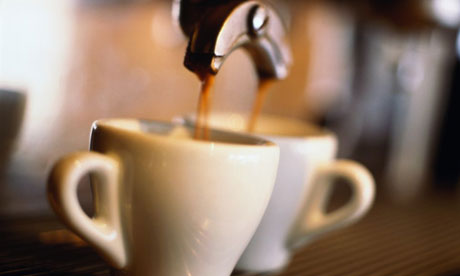
Do you feel slightly ashamed of your caffeine habit? Perhaps you needn't feel so guilty about all those caffeine-fuelled mornings now that scientists have found further evidence that drinking coffee has health benefits – possibly protecting against certain cancers.
Mia Hashibe of the University of Utah, Salt Lake City, pooled data from nine case-control studies of head and neck cancers, which between them compared the coffee-drinking habits of 5,139 cases with that of 9,028 controls. Her analysis showed that people who drank more than four cups of coffee a day had a 39% decreased risk of cancers of the oral cavity and pharynx combined, compared with those who didn't drink coffee.
"Since coffee is so widely used and there is a relatively high incidence and low survival rate of these forms of cancers, our results have important public health implications that need to be further addressed," said Hashibe. "What makes our results so unique is that we had a very large sample size, and since we combined data across many studies, we had more statistical power to detect associations between cancer and coffee."
The results were published online in Cancer Epidemiology, Biomarkers & Prevention, a journal of the American Association for Cancer Research, and used studies from the International Head and Neck Cancer Epidemiology (INHANCE) consortium.
Hashibe's work adds to the growing body of evidence on the benefits of caffeinated drinks. Scientists at Imperial College London also found that people who drank more than five cups of coffee or tea a day had a decreased risk of a type of brain tumour called a glioma. And, last year, Harvard University researchers showed that men who drank coffee had a 60% reduced risk of developing aggressive prostate cancer compared with men who drank no coffee.
Coffee has also been linked to reduced rates of colorectal and endometrial cancer as well as liver cancer and cirrhosis.
"The fact that this was seen for oral and pharyngeal cancers, but not laryngeal cancers, provides some evidence as to a possible specificity of effect," said Johanna Lampe of the division of public health sciences at the Fred Hutchinson Cancer Research Center in Seattle. She is also an editorial board member for the journal that published Hasibe's work. "These findings provide further impetus to pursue research to understand the role of coffee in head and neck cancer prevention," she added.
Though Hashibe's work shows an association between caffeine and cancer risk, it does not shed any light on the mechanisms involved, or what dose of caffeine is healthiest. In the paper, the researchers point out that coffee contains phenols, some of which are known to have antioxidant properties. Others are thought to activate enzymes that help the body deal with carcinogens.
Ed Yong, head of health information at Cancer Research UK, said: "Coffee is a cocktail of hundreds of different chemicals and we don't know which of these, if any, could affect the risk of cancer. You often only see benefits in people who drink a great deal of coffee. And studies like these rely on people with cancer remembering how much coffee they drank years ago. We now need studies that look at larger groups of initially healthy people to see if the amount of coffee they drink affects their cancer risk over time."

